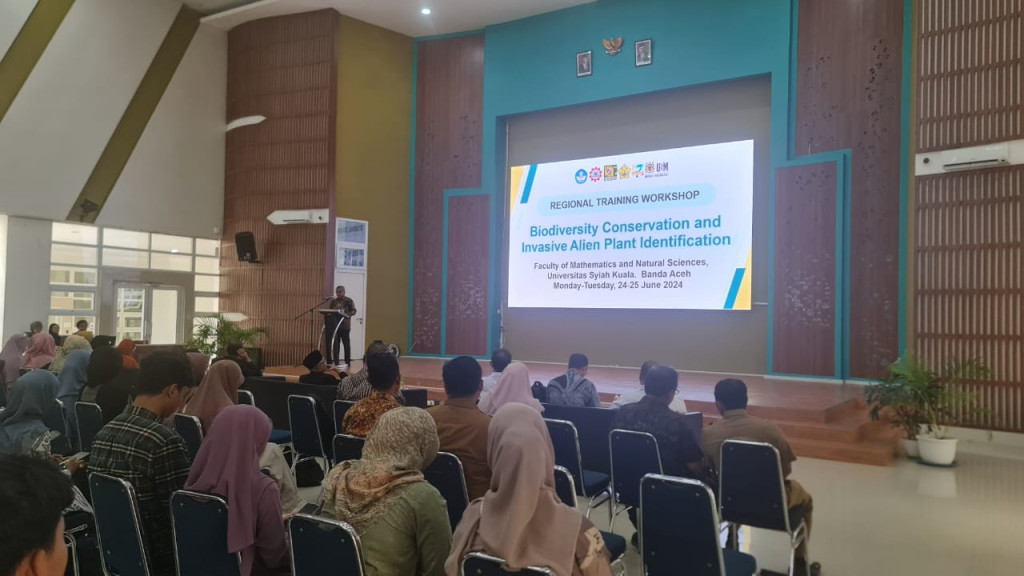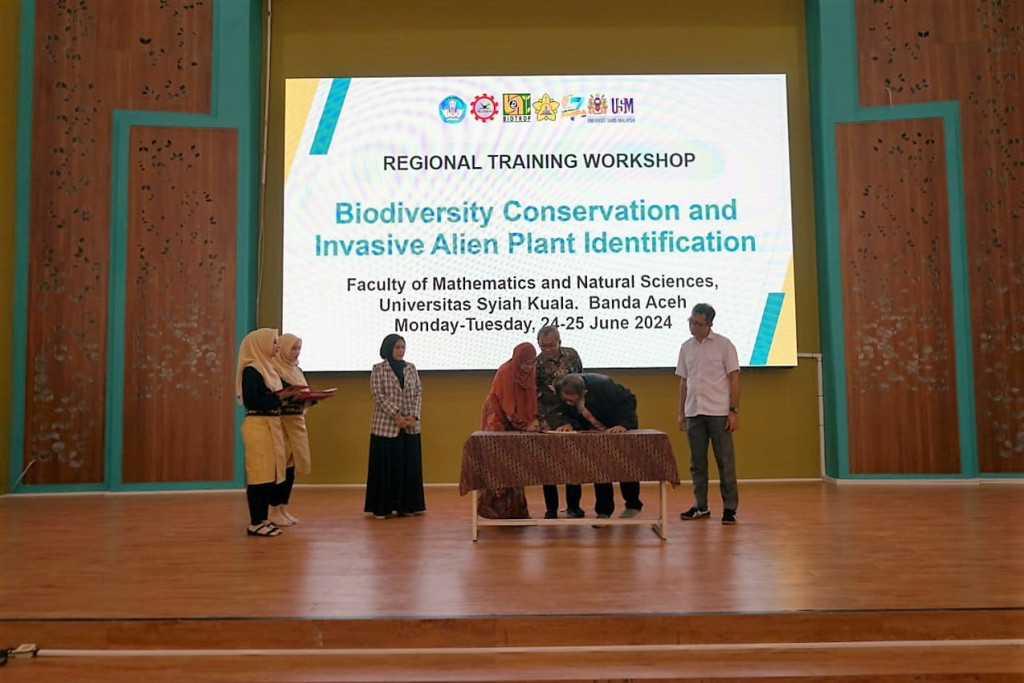
Banda Aceh, June 24, 2024 – The Faculty of Mathematics and Natural Sciences (FMIPA) at Universitas Syiah Kuala (USK) collaborated with SEAMEO BIOTROP and Universiti Sains Malaysia (USM) to organize a training workshop titled “Biodiversity Conservation and Invasive Alien Species Identification.” The event, held on the USK campus, aimed to enhance participants’ capacity and knowledge in biodiversity conservation and the identification and control of invasive alien species.
The workshop was attended by academics, researchers, students, and conservation practitioners from Indonesia and Malaysia. This initiative is part of a joint effort by the three institutions to promote regional collaboration in environmental research and education. Participants engaged in various presentation sessions, group discussions, and field activities to practice techniques for identifying and managing invasive species. Additionally, they had the opportunity to exchange information and build collaborative networks among their institutions.

Dean of FMIPA USK, Prof. Dr. Taufik Fuadi Abidin, S.Si, M.Tech., expressed hope that the ecosystem studies conducted would address the causes of environmental damage, leading to ecosystem balance. He emphasized that effective teamwork across departments is crucial for more detailed research studies. “This collaboration is a concrete step in strengthening research networks and conservation efforts in Southeast Asia,” said Prof. Taufik.
SEAMEO BIOTROP, as a leading center for tropical biology research and training in Southeast Asia, made significant contributions to the workshop. Dr. Zulhamsyah Imran, Director of SEAMEO BIOTROP, hoped that through this training and workshop, the network for biodiversity conservation in Indonesia, especially in Aceh, would be expanded. He stressed the importance of the event not only as an introduction but also as a demonstration of concern for Indonesia’s biodiversity. Meanwhile, the USM-Malaysia delegation, represented by Associate Professor Dr. Darlina Binti Md Naim, expressed gratitude for the invitation and affirmed that the cooperation would continue in the future.
The workshop covered topics such as the concept of invasive alien species, digitization of herbarium specimens, herbarium management, identification of invasive alien species, genetic diversity, and habitat suitability prediction for ferns. Speakers included experts from China, SEAMEO BIOTROP, Universiti Sains Malaysia, and Universitas Syiah Kuala. The speakers were Dr. Soekisman Tjitrosemito (SEAMEO BIOTROP), Dr. Sri Sudarmiyati Tjitrosedirdjo (SEAMEO BIOTROP), Dr. Syarifah Ab Rashid (Universiti Sains Malaysia), Dr. Rosazlina Rusly (Universiti Sains Malaysia), and Dr. Saida Rasnovi, S.Si, M.Si (Biology FMIPA-USK). Additionally, Chihjen Ko from GBIF (Asia Regional Support) in China presented on the digitization of herbarium specimens and Darwin Core to GBIF (Global Biodiversity Information Facility).
This workshop is expected to serve as a starting point for closer collaboration between USK, SEAMEO BIOTROP, and USM in biodiversity conservation and management efforts in Southeast Asia. With activities like this, it is hoped that stronger synergy will be created to sustain ecosystems and biodiversity in the future.
Besides the workshop, USK, SEAMEO BIOTROP, and USM also held a meeting to discuss short-term and long-term programs. The tripartite meeting, attended by Prof. Dr. Lenny Fitri, S.Si, M.P., Head of the Biology Department at USK, Associate Professor Dr. Darlina Binti Md Naim from USM, and Dr. Zulhamsyah Imran, Director of SEAMEO BIOTROP, explored the potential for tripartite collaboration between USK, USM, and BIOTROP. Prof. Dr. Lenny Fitri hoped that this collaboration would be realized effectively. “Moreover, researchers from Vietnam will also be involved,” added Prof. Lenny. The short-term plans include sharing sessions (seminars/webinars) and postgraduate conferences, while the long-term plans encompass collaboration in publications, research, and the development of a three-track Summer School program in Aceh, Bogor, and Penang.

